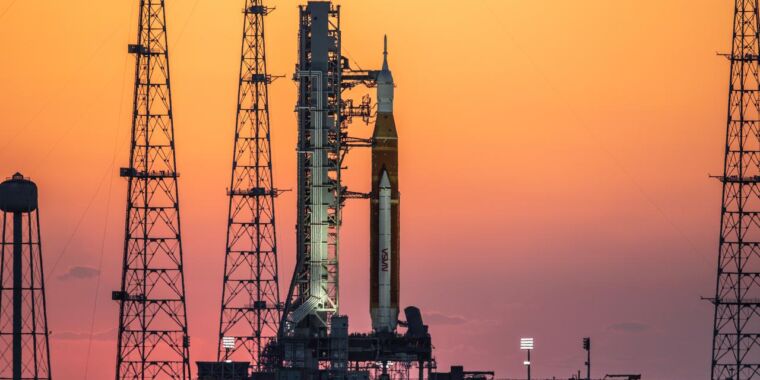NASA
President Joe Biden on Monday released his budget request for the upcoming fiscal year, and NASA is the big winner. The administration is asking Congress to fund $25.9 billion for the space agency in 2023, an increase of nearly $2 billion from the $24 billion the agency received for fiscal year 2022.
a NASA budget request It includes a health boost to the Artemis program, which seeks to make a series of human moon landings later this decade. Notably, HLS funding will increase from $1.2 billion in the current fiscal year to $1.5 billion, allowing a second provider to go live. In addition, funding for lunar spacesuits will increase from $100 million to $276 million. NASA will also receive significant funding – $48 million – to begin developing campaigns for human exploration of the moon and beyond.
All of this new funding comes in the proposed budget, as well as the billions that NASA spends annually developing the Space Launch System rocket and Orion spacecraft. Thus, Artemis’ total funding will increase from $6.8 billion in fiscal year 2022 to $7.5 billion in the next fiscal year, beginning October 1, 2022.
This means that for the first time, the agency can receive all the funds necessary for the main programs to carry out landings on the Artemis moon surface. “This budget puts us on the right track,” NASA Assistant Administrator Bob Cabana said during a conference call with reporters Monday afternoon.
Money must come
There is reason to believe that NASA will receive most of the money that President Biden has requested. Over the past year, the Democratic-led Congress has supported the president’s budget priorities for NASA. The agency’s director, former US Senator Bill Nelson, has demonstrated his ability to work with Democrats and Republicans in Congress. So if NASA can get all the funding it asked for, is it reasonable to ask for the results in return?
The agency’s current schedule for Artemis’ first three missions calls for the launch of Artemis 1, an unmanned flight to the moon, this summer; Artemis 2, a manned flight to the moon, in 2024; and Artemis 3, two astronauts who landed on the moon in 2025.
Congress asked Jim Fry, associate administrator for NASA’s Exploration Systems Development Mission Directorate, if NASA could commit to landing humans on the Moon by 2025 if the agency received the full budget request this year and beyond.
Fry replied, “I can say we’re working every day to get Artemis 1, Artemis 2 in 2024, and Artemis 3 in 2025.” “I’m not sure what a commitment is like for you, but I can tell you a lot of people go to work every day and work their way up to 2025.”
Other parts of the budget
In conjunction with the Artemis program, the budget request will fund NASA science programs at ever-increasing levels, due in large part to cost overruns in europe cutting machine Mission. The cost of the mission, which will make dozens of flights to the intriguing Jovian Moon from which its name is derived, increased by $703 million to nearly $5 billion. To accommodate the cost overruns, several other missions will be delayed, including the NEO Surveyor, a mission to detect near-Earth asteroids.
The budget request also seeks to double funding for a “commercial” space station development program when the International Space Station is decommissioned. NASA is working with four different contractors on different proposals to have these private space stations ready to go or in orbit by the end of 2020. To fund this effort called Commercial Development of Low Earth Orbit, the requested budget requires an increase of US$1. $103 million in 2022 to $224 million.
“NASA’s strong budget sends a message to our clients and investors about the agency’s intentions and confidence in our vision, and [the budget] It also supports America’s competitive leadership in the commercial sector,” said Michael Suffredini, president and CEO of Axiom, one of the companies working with NASA.
Funding for these commercial station options appears likely given the current tensions between the United States and its main partner on the International Space Station, Russia.

“Coffee trailblazer. Social media ninja. Unapologetic web guru. Friendly music fan. Alcohol fanatic.”

